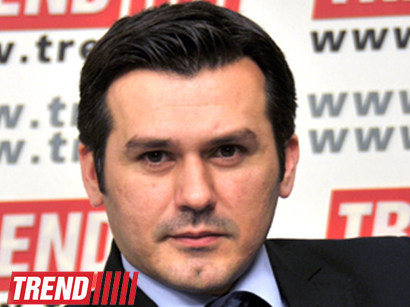Baku, Azerbaijan, Sept. 25
By Rufiz Hafizoglu - Trend:
Pentagon spokesman Rear Admiral John Kirby said this week that the U.S began to direct air strikes on terrorists (Jabhat al-Nusra, Khorasan and Islamic State (IS, formerly ISIL or ISIS)) in Iraq and Syria.
Saudi Arabia, Qatar, Bahrain, Jordan and the UAE joined the coalition against radical Islamists.
First Ankara avoided joining the coalition. But after 49 diplomats, held captive by the IS, were released, it decided to participate in the coalition.
The attitude of the Islamic world towards the coalition against the IS and other groups posing a threat to the Islamic world and the region as a whole, is ambiguous.
For example, many Islamic scholars stressed the importance of the fight against the IS. But they said that it is wrong to support the U.S in this fight. Others called it "Sunni coalition against the Sunnis."
Despite the destruction of the IS and other groups in the interests of Iran, Tehran announced that it would not join the coalition. And there are many reasons for such an action. The most important reason is the view that the operations against the IS serves only U.S interests. Moreover, they are aimed at the overthrow of the Syrian government.
Indeed, Iran's actions against the coalition are in the interest of the country. It is hard to imagine that after Syria's territory, controlled by the IS, is liberated, it was transferred to Bashar al Assad's government. After the liberation, these territories will be controlled by the "Free Syrian Army." This does not correspond to Iran's interests at least because it has repeatedly said that there will be no place for Iran in new Syria.
Why 'Islamic State'?
All the killed leaders of the IS (Abu Ali al-Anbari, Abu Ayman al-Iraqi, Abu Ahmad al-Alwani, Abu Fatima, Muhammad al-Adnani, Haji Bakir and Abu Abdul Rahman al Bilavi) and its current leader Abu Bakr al-Baghdadi are Iraqis and it is not accidental.
It means that there are 'no foreign elements in the organization's management', which is of great importance for the Sunnis who were fighting against the government of former Iraqi Prime Minister Nouri al-Maliki.
The IS, initially founded under the name of Jamaat al-Tawhid wal-Jihad, changed its name to ISIL (the Islamic State of Iraq and the Levant) to operate in Syria and Iraq and then took its current name - the Islamic State.
Thereby, the organization aims to attract jihadists not only from Iraq, Syria and other Arab states, but also from all over the world, which gives ground to say that alongside with the military wing of the IS, its campaign structures also do significant work.
On the one hand, IS and other terrorist organizations threaten the neighboring countries, and on the other hand, they give opportunity to the states to get rid of radical Islamists in their territories.
Air strikes on the IS and their outcomes
It is unlikely that the air strikes will completely destroy the ideological and military wing of the IS.
Despite the fact that the military operations will weaken the IS, sooner or later they will force the organization to change its strategy, and start an "underground" fight. And it is not easy to fight such kind of warfare.
On the other hand, the air strikes will cause a refugee flow in the region. And this will create a good chance for the terrorists to enter other countries.
Earlier, the EU counter-terrorism coordinator, Gilles de Kerchove said the Kurdistan Workers' Party, known as PKK, is also engaged in the fight against the IS.
So, the military operations against the IS can also lead to other changes in the region.
De Kerchove said "Turkey is demanding that the EU keeps the PKK in the terrorist organizations list. The PKK will be excluded from the list of terrorist organizations after reaching a real outcome in the talks between the PKK and Turkey."
The PKK's opening an active front against the IS can result in the organization's arming, and this does not meet Turkey's interests.
Analyzing the developments in Iraq and Syria, one can say that the special forces of not only Iran and Turkey, but also the neighboring Arab states and the West are fighting under the "shadow of the Caliphate".
And it is obvious that this fight will not end soon.
Rufiz Hafizoglu is the head of the Trend Arabic News Service
Edited by CS






